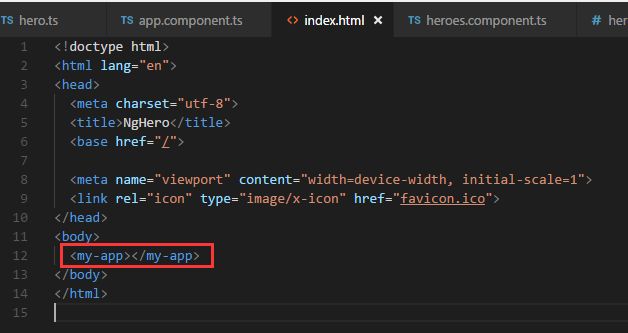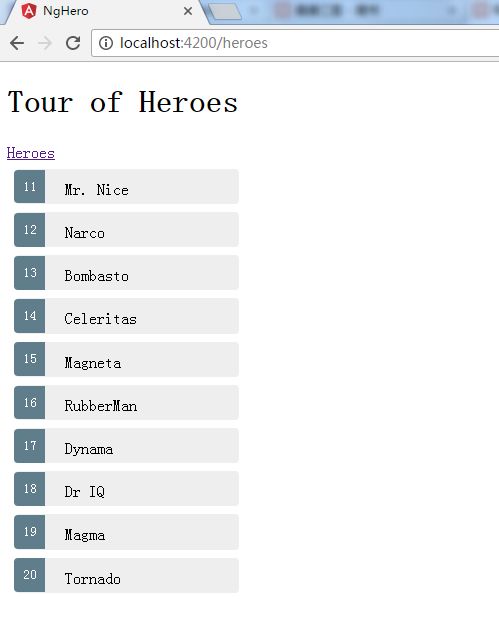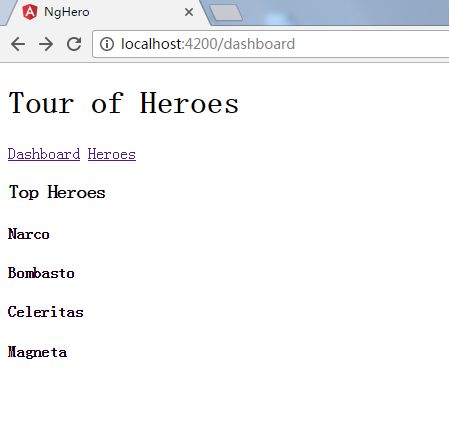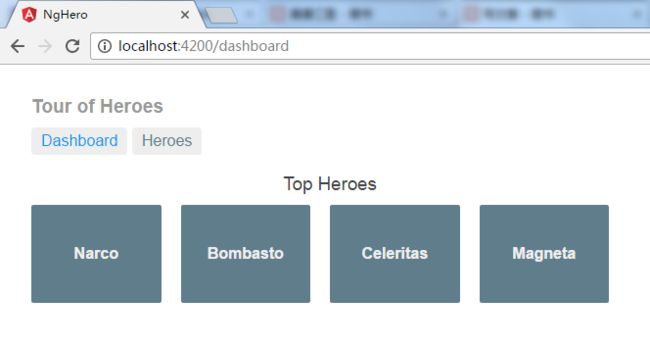添加路由和导航
1、添加heroes.component.ts组件
ng g component heroes
import { Component,OnInit } from '@angular/core';
import {Hero} from '../hero';
import {HeroDetailComponent} from '../hero-detail/hero-detail.component';
import {HeroService} from '../hero.service';
@Component({
selector: 'my-heroes',
template:`
-
{{hero.id}} {{hero.name}}
将app.component.css样式剪切到heroes.component.css中
改写app.component.ts组件(现在它只是一个承载的容器)
import { Component } from '@angular/core';
@Component({
selector: 'my-app',
template: `
{{title}}
上面的selector已经更改成了 my-app,所以index.html中也要作相应的标签修改
2、添加路由
app.module.ts中添加路由
import { RouterModule } from '@angular/router';
RouterModule.forRoot([
{
path: 'heroes',
component: HeroesComponent
}
])
在app.component.ts的template中添加路由链接和router-outlet
完成后效果
3、添加仪表盘组件 dashboard.component.ts ng g component dashboard
import { Component } from '@angular/core';
@Component({
selector: 'my-dashboard',
template: 'My Dashboard
'
})
export class DashboardComponent { }
并在app.module.ts的路由中添加dashboard.component.ts组件的路由和设置重定向路由
RouterModule.forRoot([
{path:'',redirectTo:'/dashboard',pathMatch:'full'},
{ path: 'heroes', component: HeroesComponent},
{ path: 'dashboard',component: DashboardComponent }
])
app.component.ts的template模板稍作修改
template: `
{{title}}
修改dashboard.component.ts和dashboard.component.html文件
dashboard.component.ts
import { Component,OnInit } from '@angular/core';
import{Hero} from '../hero';
import {HeroService} from '../hero.service';
@Component({
selector: 'my-dashboard',
templateUrl: './dashboard.component.html'
})
export class DashboardComponent implements OnInit {
heroes:Hero[]=[];
constructor(private heroService:HeroService){
}
ngOnInit():void{
this.heroService.getHeroes().then(heroes=>this.heroes=heroes.slice(1,5))
}
}
dashboard.component.html
Top Heroes
{{hero.name}}
4、参数化路由
目的: a、在dashboard和英雄列表中点击单个的英雄,导航到详情组件
b、地址栏上写上英雄详情的参数,查看详情信息
app.module.ts的路由中添加一条规则
RouterModule.forRoot([
{path:'',redirectTo:'/dashboard',pathMatch:'full'},
{ path: 'heroes', component: HeroesComponent},
{ path: 'dashboard',component: DashboardComponent },
{ path:'detail/:id',component:HeroDetailComponent}
])
修改hero-detail.component.ts文件
import { Component,Input,OnInit } from '@angular/core';
import {ActivatedRoute,Params} from '@angular/router';
import {Location} from '@angular/common';
import 'rxjs/add/operator/switchMap'; //switchMap用到
import {Hero} from '../hero';
import {HeroService} from '../hero.service';
@Component({
selector: 'hero-detail',
template: `
{{hero.name}} details!
{{hero.id}}
`
})
export class HeroDetailComponent implements OnInit{
@Input() hero:Hero; //输入属性
constructor(
private heroService:HeroService,
private route:ActivatedRoute,
private location:Location
) {
}
ngOnInit():void{
this.route.params.switchMap((params:Params)=>this.heroService.getHero(+params['id']))
.subscribe(hero=>this.hero=hero)
}
goBack(): void {
this.location.back();
}
}
hero.service.ts服务中添加方法 getHero(id:number):Promise
getHero(id: number): Promise {
return this.getHeroes()
.then(heroes => heroes.find(hero => hero.id === id));
}
查看运行结果
5、重构路由为路由模块
按约定,路由模块的名字应该包含 “Routing”,并与导航到的组件所在的模块的名称看齐。
在app.module.ts所在目录创建app-routing.module.ts文件。将下面从AppModule类提取出来的代码拷贝进去:
import { NgModule } from '@angular/core';
import {RouterModule,Routes} from '@angular/router';
import {DashboardComponent} from './dashboard/dashboard.component';
import { HeroesComponent } from './heroes/heroes.component';
import { HeroDetailComponent } from './hero-detail/hero-detail.component';
const routes:Routes=[
{path:'',redirectTo:'/dashboard',pathMatch:'full'},
{ path: 'heroes', component: HeroesComponent},
{ path: 'dashboard',component: DashboardComponent },
{ path:'detail/:id',component:HeroDetailComponent}
];
@NgModule({
imports: [
RouterModule.forRoot(routes)
],
exports:[RouterModule]
})
export class AppRoutingModule { }
典型路由模块需要注意的有:
1)将路由抽出到一个变量中。如果你将来要导出这个模块,这种 "路由模块" 的模式也会更加明确。
2)添加RouterModule.forRoot(routes)到imports。
3)把RouterModule添加到路由模块的exports中,以便关联模块(比如AppModule)中的组件可以访问路由模块中的声明,比如RouterLink 和 RouterOutlet。
4)无declarations!声明是关联模块的任务。
5)如果有守卫服务,把它们添加到本模块的providers中(本例子中没有守卫服务)。
修改 AppModule
删除AppModule中的路由配置,并导入AppRoutingModule (使用 ES import语句导入,并将它添加到NgModule.imports列表)。
import { BrowserModule } from '@angular/platform-browser';
import { NgModule } from '@angular/core';
import {FormsModule} from '@angular/forms';
import {RouterModule} from '@angular/router';
import { AppComponent } from './app.component';
import { HeroDetailComponent } from './hero-detail/hero-detail.component';
import {HeroService} from './hero.service';
import { HeroesComponent } from './heroes/heroes.component';
import { DashboardComponent } from './dashboard/dashboard.component';
import {AppRoutingModule} from './app-routing.module';
@NgModule({
declarations: [
AppComponent,
HeroDetailComponent,
HeroesComponent,
DashboardComponent
],
imports: [
BrowserModule,
FormsModule,
AppRoutingModule
],
providers: [HeroService],
bootstrap: [AppComponent]
})
export class AppModule { }
6、修改heroes.component.ts文件
import { Component,OnInit } from '@angular/core';
import {Router} from '@angular/router';
import {Hero} from '../hero';
import {HeroDetailComponent} from '../hero-detail/hero-detail.component';
import {HeroService} from '../hero.service';
@Component({
selector: 'my-heroes',
template:`
-
{{hero.id}} {{hero.name}}
{{selectedHero.name | uppercase}} is my hero
`,
styleUrls:['./heroes.component.css']
})
export class HeroesComponent implements OnInit {
heroes:Hero[];
selectedHero:Hero;
constructor(private heroService:HeroService,private router:Router){
}
onSelect(hero:Hero):void{
this.selectedHero=hero;
}
getHeroes():void{
this.heroService.getHeroes().then(heroes => this.heroes = heroes);
}
ngOnInit(){
this.getHeroes();
}
gotoDetail(): void {
this.router.navigate(['/detail', this.selectedHero.id]);
}
}
7、为应用添加一些样式
- hero-detail.component.css
label {
display: inline-block;
width: 3em;
margin: .5em 0;
color: #607D8B;
font-weight: bold;
}
input {
height: 2em;
font-size: 1em;
padding-left: .4em;
}
button {
margin-top: 20px;
font-family: Arial;
background-color: #eee;
border: none;
padding: 5px 10px;
border-radius: 4px;
cursor: pointer; cursor: hand;
}
button:hover {
background-color: #cfd8dc;
}
button:disabled {
background-color: #eee;
color: #ccc;
cursor: auto;
}
2)app.component.css
h1 {
font-size: 1.2em;
color: #999;
margin-bottom: 0;
}
h2 {
font-size: 2em;
margin-top: 0;
padding-top: 0;
}
nav a {
padding: 5px 10px;
text-decoration: none;
margin-top: 10px;
display: inline-block;
background-color: #eee;
border-radius: 4px;
}
nav a:visited, a:link {
color: #607D8B;
}
nav a:hover {
color: #039be5;
background-color: #CFD8DC;
}
nav a.active {
color: #039be5;
}
3)dashboard.component.css
[class*='col-'] {
float: left;
padding-right: 20px;
padding-bottom: 20px;
outline: none;
}
[class*='col-']:last-of-type {
padding-right: 0;
}
a {
text-decoration: none;
}
*, *:after, *:before {
-webkit-box-sizing: border-box;
-moz-box-sizing: border-box;
box-sizing: border-box;
}
h3 {
text-align: center; margin-bottom: 0;
}
h4 {
position: relative;
}
.grid {
margin: 0;
}
.col-1-4 {
width: 25%;
}
.module {
padding: 20px;
text-align: center;
color: #eee;
max-height: 120px;
min-width: 120px;
background-color: #607D8B;
border-radius: 2px;
}
.module:hover {
background-color: #EEE;
cursor: pointer;
color: #607d8b;
}
.grid-pad {
padding: 10px 0;
}
.grid-pad > [class*='col-']:last-of-type {
padding-right: 20px;
}
@media (max-width: 600px) {
.module {
font-size: 10px;
max-height: 75px; }
}
@media (max-width: 1024px) {
.grid {
margin: 0;
}
.module {
min-width: 60px;
}
}
为活动路由添加样式,Angular路由器提供了routerLinkActive指令,我们可以用它来为匹配了活动路由的 HTML 导航元素自动添加一个 CSS 类。
app.component.ts中的template
template: `
{{title}}
全局样式
style.css
/* Master Styles */
h1 {
color: #369;
font-family: Arial, Helvetica, sans-serif;
font-size: 250%;
}
h2, h3 {
color: #444;
font-family: Arial, Helvetica, sans-serif;
font-weight: lighter;
}
body {
margin: 2em;
}
body, input[text], button {
color: #888;
font-family: Cambria, Georgia;
}
/* . . . */
/* everywhere else */
* {
font-family: Arial, Helvetica, sans-serif;
}
最后效果




